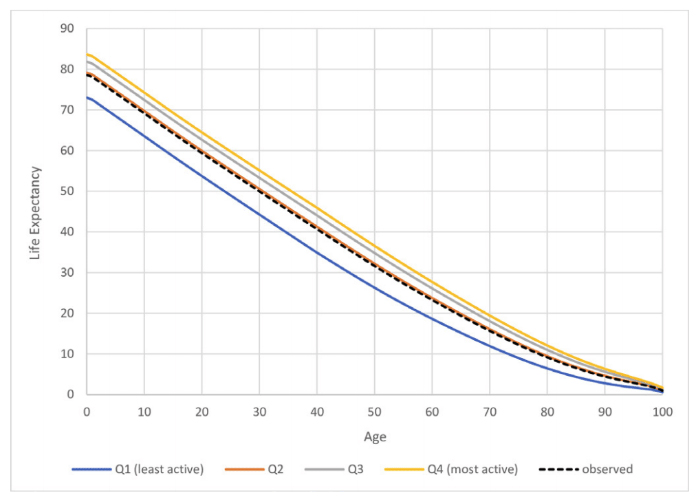December 26, 2024

A new study gives all of us some extra motivation when it comes to getting outside and exercising: every day you manage to fit in an additional one-hour walk, you could be boosting your lifespan by an extra six hours.
That's the approximate benefit if you're currently in the 25 percent least active people in the US, according to fitness tracker data crunched by a team led by researchers from Griffith University in Australia.
If you're in the top 25 percent, an extra walk isn't as much of a boost – you've already received most of the health benefits from exercise – but the study also highlights and quantifies some of the key benefits of an active life.

"If all individuals were as active as the top 25 percent of the population, Americans over the age of 40 could live an extra 5.3 years on average," write the researchers in their published paper.
"The greatest gain in lifetime per hour of walking was seen for individuals in the lowest activity quartile where an additional hour's walk could add 376.3 min (about 6.3 hours) of life expectancy."
The team analyzed wearable activity data from the National Health and Nutritional Examination Survey (NHANES) in the US, which recruits 5,000 volunteers a year. In this particular study, data on 824 participants were excluded because they didn't wear the trackers for long enough.
To calculate how changes in activity levels can influence mortality risk, researchers referenced the NHANES results against a life-table model (where mortality rates are tracked at specific age points) and previous research into exercise and lifespan.
The team is keen to raise awareness about how many health benefits come with additional exercise – and moving your way up between the quartiles may be more achievable than you think, even from the lowest to the highest.
"This is not an unreasonable prospect, as 25 percent of the population is already doing it," says Lennert Veerman, a professor of public health at Griffith University.
"It can be any type of exercise [to reach that top quartile] but would roughly be the equivalent of just under three hours of walking per day."
Suggesting that exercise leads to a longer life is nothing new, but quantifying and simplifying the benefits can grab attention – whether it's five minutes a day to reduce blood pressure or nine seconds a week to grow muscle.
Now there's a new target to aim for: an extra hour's walk a day. If you find that too daunting a prospect, remember that any amount of exercise makes a difference to health and well-being.
"If there's something you could do to more than halve your risk of death, physical activity is enormously powerful," says Veerman.
"If we could increase investment in promoting physical activity and creating living environments that promote it such as walkable or cyclable neighbourhoods and convenient, affordable public transport systems, we could not only increase longevity but also reduce pressure on our health systems and the environment."
The research has been published in the British Journal of Sports Medicine.